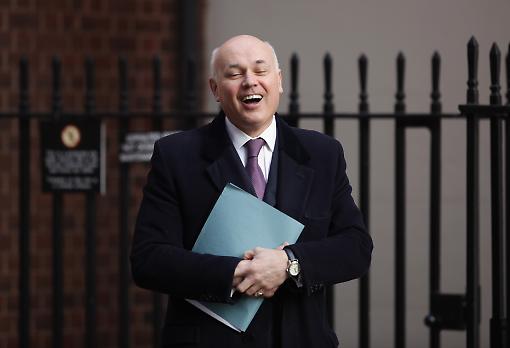The Labour party has called an opposition day debate on the subject of the bedroom tax. The bedroom tax has proved hugely disruptive to poor families and the disabled. The debate may be ongoing now or I may have missed it.
Iain Duncan Smith – the architect of the bedroom tax – will avoid the debate.
http://www.politics.co.uk/news/2013/11/12/ids-no-show-for-bedroom-tax-debate
A group of five Liberal Democrat MPs have broken ranks and signed a motion demanding reform of the bedroom tax.
Ahead of an opposition day debate on what the coalition calls the ‘spare room subsidy’, Greg Mulholland, Ian Swales, Adrian Sanders, Roger Williams and John Leech said no-one should be subject to the financial penalty unless they had refused a suitable alternative home.
“I understand what the government is trying to do. They are trying to cut council house waiting lists and equalise rent levels by extending something the last Labour government brought in for private sector homes,” Leech said.
“My main problem with the plans is that, because Labour didn’t build enough social housing, there aren’t enough houses for people to downsize into.”
…
http://www.newstatesman.com/politics/2013/11/why-all-mps-should-vote-against-indefensible-bedroom-tax
Today Labour is calling time on David Cameron’s hated Bedroom Tax with a vote in parliament for its immediate repeal. The tenuous case for the policy now lies in tatters, with mounting evidence that it is not only flagrantly unfair but also counterproductive as a way of controlling benefit costs.
The 660,000 families affected include 400,000 disabled people and 375,000 children. Through no fault of their own, some of Britain’s hardest-pressed low-income households are expected to find, on average, an extra £720 a year – or face losing their home.
This punitive penalty presents appalling dilemmas for vulnerable families already struggling to survive at the sharp end of David Cameron’s cost-of-living crisis. The loss of income is equivalent to losing all child benefit paid for a second or subsequent child – or more than the average cost of a daily school meal. The result has been more people resorting to Food Banks, according to the Trussell Trust, as well as expanding opportunities for payday lenders.
Surveys suggest that as many as half of those affected are already behind with their rent – the mounting arrears further destabilising the precarious finances of local housing providers. And the costs of evicting those who can’t pay, and dealing with the resulting homelessness, could be astronomical.
…
http://www.theguardian.com/commentisfree/2013/nov/12/stop-bedroom-tax-misery-danny-alexander
Danny Alexander is thought to be “embarrassed” after his own father publicly called the bedroom tax – arguably the symbol of the coalition’s welfare cuts – “particularly unfair”. It would be something if embarrassment were sufficient to end seven months of incompetence and pain. Even shame doesn’t seem to work. If it did, stories of a 13-year-old boy, unable to walk or talk, being told to spend his care allowance on his family’s extra rent might have done it. Or a single mother taking an overdose because she couldn’t bear the debt the bedroom tax had put her in.
The systematic hacking of social security from this country’s most vulnerable has been done with barely a whimper of remorse from the most powerful. This government seems to almost revel in the mess it makes, blustering past criticism from experts, committees and courts. The vulnerable are afraid. They have reason to be. Leaders who have no affection for logic, let alone fairness, are quite terrifying.
It was clear before the bedroom tax was even implemented back in April that it was largely going to hurt people with disabilities or illness and people living in poverty; the sections of society who could least afford the charge and who had no way of escaping it. The government either didn’t notice or they didn’t care. Which, I wonder, is worse?
…
http://www.theguardian.com/society/2013/nov/12/labour-criticises-iain-duncan-smith-missing-bedroom-tax
Labour has criticised Iain Duncan Smith, the work and pensions secretary, for missing a debate on the bedroom tax, which the party will argue is unfair and fails to save the taxpayer money.
The policy will be discussed in an opposition day debate in parliament on Tuesday, giving MPs a vote on whether to repeal the cuts to housing benefit for claimants with a spare bedroom.
Labour argues that the bedroom tax is unworkable as the vast majority of the 660,000 people affected are not able to move to smaller accommodation. However, the coalition describes the move as removing a spare room subsidy and believes it will save the taxpayer around £500m.
Rachel Reeves, the shadow work and pensions secretary, said the secretary of state’s absence showed how out of touch the government was on the issue.
“This vote gives MPs a chance to show where they stand and vote to repeal this unjust and unworkable policy,” she said. “If Tory and Lib Dem MPs vote against repeal, we won’t let them forget it – and we’ll step up our campaign to elect a Labour government that will.”
The Department for Work and Pensions said Duncan Smith was unable to be at the debate because he would be in Paris for an international summit on youth unemployment, which would be attended by Angela Merkel, the German chancellor, and François Hollande, the French president.
…
